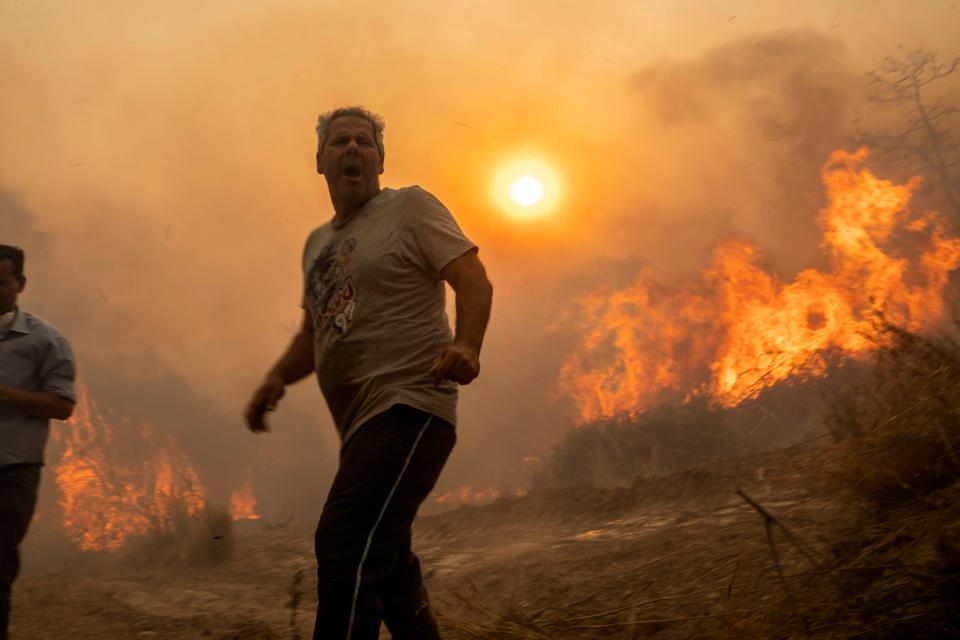Editorial: The climate crisis is already here. Iowa has to work on adapting.
The oppressive heat that has stalked the country this summer finally reached Iowa last week. A few near-triple-digit days in our state in July isn’t at all out of the ordinary. These developments are a good bit more alarming, however:
Atlantic Ocean currents that circulate heat around the planet could be slowing in a way not seen in millennia, according to research published Tuesday. It’s possible the currents will collapse in the next 75 years, scientists said.
A prolonged heat wave in Florida has contributed to what some scientists suspect are unprecedented water temperatures off the coast, exceeding 100 degrees Fahrenheit in places, according to the Washington Post.
Global temperatures have set weekly and monthly record highs, the World Meteorological Organization said this month. Antarctic sea ice has never been lower in June in about 45 years of satellite observations.
These aren't predictions. This is what's happening, now.
A part of the political fight concerning human-caused climate change has always been whether scientists’ understanding of what was happening was sufficient to justify the dramatic societal upheavals required to reduce carbon dioxide emissions in a meaningful way.

The near-consensus among serious climate investigators should leave little doubt. But even those who reject projections from such groups as the Intergovernmental Panel on Climate Change, and the attribution of warming to human activity, cannot so easily shrug their shoulders at conditions that are now being observed directly. The record temperatures and other headlines are not merely a “projection” subject to revision. They are real.
They also fit well into the idea that gradual warming will inevitably lead to “tipping points,” where some planetary systems undergo sudden and drastic transformation with potentially grave consequences for human activity. This is one of the reasons that discussions of, for instance, the threshold of a 1.5-degree Celsius increase in global temperatures are not nearly as innocuous as that figure sounds to lay people.
More: Climate change isn't a top issue for Democrats or Republicans. Record heat should change that.
Iowa needs a new climate-adaptation mindset
How should Iowa react? One way to start would be to start treating climate issues as a matter of stewardship and public health, rather than fixating on economic development considerations. It’s been dispiriting but illuminating over the past couple of years to see how nakedly state leaders and the ethanol industry present proposed carbon dioxide pipelines as solely an economic development tool reflecting what Gov. Kim Reynolds called in 2021 “the growing nationwide demand for a more carbon free economy.”
Environmental advocates are deeply skeptical that the pipelines can be a net benefit to the state and region, but that leaders don’t even pretend to have CO2-emissions motivations for their own sake is disappointing.
Government at all levels, businesses of all sorts and individuals have roles to play in decisions that address carbon dioxide emissions in ways large and small.
But just as important is providing more urgent attention to what adaptations to an altered climate might look like. That means what Iowa farmers grow and how. It means assessing flood risk with the expectation that history is not a strong guide for the frequency and severity of what will happen in the future. It means worrying about water use and the prospects for such sources as the Jordan aquifer.
Help people maintain cooling during heat waves
Here is a small idea to kick things off. Iowa should change its law to join the 19 states that bar utilities from shutting off service to customers for nonpayment when the weather is the hottest. The state has long had a moratorium on utility cutoffs for certain customers from Nov. 1 to April 1 to help ensure proper heating, and it’s an important protection for the health of Iowans with low incomes. Utilities also take their own initiative, such as suspending cutoffs at the start of the coronavirus pandemic. But the potential for more frequent heat waves should prompt a look at taking some shutoffs off the table and then, separately, helping utilities and customers have the resources to handle peak demand for cooling.
It’d be a small signal to Iowans that things really are observably changing and that it’s not tenable to assume that planet-level systems will work themselves out without human response.
FURTHER READING: Extreme heat is killing more people, and the worst is yet to come
FURTHER READING: Climate change could hammer Iowa agriculture and manufacturing
— Lucas Grundmeier, on behalf of the Register editorial board
This editorial is the opinion of the Des Moines Register's editorial board: Carol Hunter, executive editor; Lucas Grundmeier, opinion editor; Rachelle Chase, opinion columnist; and Richard Doak and Rox Laird, editorial board members.
Want more opinions? Read other perspectives with our free newsletter, follow us on Facebook or visit us at DesMoinesRegister.com/opinion. Respond to any opinion by submitting a Letter to the Editor at DesMoinesRegister.com/letters.
This article originally appeared on Des Moines Register: Editorial: The climate crisis is already here. Iowa must adapt.

